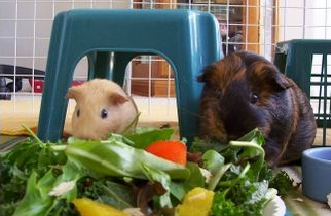Hay

Unlimited high quality, grass hay (timothy and orchard grass are popular) should always be available to each and every guinea pig, no matter what age. Eating the long hay strands keeps their digestive system moving and helps prevent their teeth from overgrowing. It is usually placed in a wire rack off the floor for cleanliness.
Alfalfa hay can be given to young guinea pigs, and pregnant, nursing or malnourished adults. But because of its high calcium content, alfalfa should be reserved as a treat for the average adult cavy. Excess calcium could contribute to the formation of bladder stones in older cavies. Remember that alfalfa is NOT a replacement for grass hay, but can be used to supplement the diet of some pigs. Grass hay should always be available to all cavies.
Oxbow and Kleenmama's Hayloft are highly recommended. Their products are of very high quality and nutritious for your piggies!
Pellets

Plain, dye-free, high quality guinea pig pellets (mixes with nuts are considered too rich and are not recommended), formulated with Vitamin C can be provided in a small, heavy ceramic bowl to prevent tipping. The bowl should be cleaned daily. Each cavy will eat approximately 1/8 cup of pellets a day when also fed adequate hay and fresh vegetables. Purchase pellets in small quantities and store in a dry cool dark place to preserve the potency of the vitamins (look for a pellet with an expiration date to check for freshness). Look for a pellet that uses stabilized vitamin C and has a "Best If Used By" date to ensure quality. Avoid pellets that use animal byproducts and those whose primary ingredient is corn.
Most cavy pellets are alfalfa based. Alfalfa pellets are suitable for young, growing and pregnant cavies. After your cavy is about a year old and fully developed (more), a timothy based pellet, which provides less calcium, may be a good choice.
Fresh Vegetables and Fruits


Fresh foods play an important role in your guinea pig's diet, along with unlimited quality hay, pellets and water. Fresh foods also help to make your guinea pig's diet tasty and interesting. They also contain a natural source of vitamins that your guinea pig needs, especially the all-important vitamin C.
Why Vitamin C? Vitamin C is especially important in a guinea pig's diet. Unlike many animals, guinea pigs can't produce their own vitamin C. A vitamin C deficiency could lead to scurvy and also loss of resistance to other diseases. Although good quality pellets contain vitamin C, it is not an adequate amount for a guinea pig. Therefore, their diet needs to be supplemented with fresh vegetables and fruits that contain vitamin C.
Here's a guide (which has been very helpful for me) to which vegetables and fruits are the best for your piggies: Veggie and Fruits Chart
Water, of course.

Guinea pigs need access to fresh water throughout the day and night. Most commonly used is a water bottle, but you can also use a water bowl as an additional water source (although not recommended, as piggies might get wet or tip over the water bowl). Guinea pigs do obtain water from their fruit and vegetables, but you need to provide a constant supply of fresh water. It is also a good idea to have more than one water bottle available to piggies, in case one bottle stops working.
Water bottles come with a sipper tube and a ball bearing, which are ideal for guinea pigs. Attach the bottle so its in easy reach for your guinea pig. Change the water every day by emptying all the water out and replace with fresh water. Twice weekly, thoroughly wash the bottles with a bottle brush. This helps to keep the bottles clean and free of algae. If you have a build up of algae, then the bottles aren't kept clean enough. If the algae appears quickly, then the bottles are getting too much sunlight, so position the cage in a more shaded area. Check the spout is clean and isn't blocked. Also, check the ball bearing to see if it's working properly.